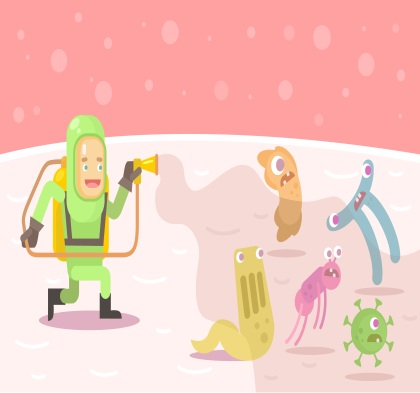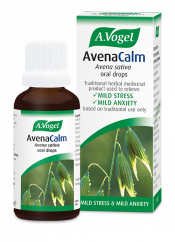Why stress is the enemy of your immune system
The immune system is the body's defence mechanism for keeping us protected and safe from the bacteria, germs and viruses which we inadvertently ingest. Good health is dependent on it's proper functioning, and like so many other systems in the body it is prone to the adverse effects of stress.
The immune system, is poised, like a police force, to deal with these threatening invaders, swiftly and efficiently, to prevent them from damaging our health.
Did you know?
Offices are good locations for transmission of viruses – Cold viruses can live on pens, computer keyboards, coffee mugs and other objects for hours, so it's easy to come into contact with such viruses during daily life. We touch our noses approximately 5 times per hour. Infected office workers coat up to 40% of a room’s surface with viruses.
Every day, billions of banknotes are exchanged worldwide –making them a perfect vector for transmission. Influenza viruses stay infectious on banknotes for up to 17 days!
How does stress weaken the immune system
Whilst stress alone cannot make us catch a cold or flu virus, it weakens the immune system's ability to respond to invaders, leaving us more vulnerable to infection. Recovery is also liable to be slower since the immune system is suppressed in favour of dealing with stress.
The body's stress-response system should be self-limiting. Once the perceived threat has passed, adrenaline and cortisol levels drop, the heart rate and blood pressure return to baseline levels, and other systems resume their regular activities.
However, when stressors and 'feeling under attack' remain constant, the fight-or-flight reaction stays turned on, over-exposing the body to cortisol and other stress hormones. The cells of the immune system (and other body systems) are unable to respond normally and produce levels of inflammation which increase the risk of further health issues.
Stress can also have an indirect effect on the immune system as we tend to resort to unhealthy coping strategies, such as smoking or drinking too much caffeine and alcohol, eating too much sugar and processed foods, not sleeping properly and giving up on exercise and healthy social activities.
A study has shown how long-term stress plays havoc with the immune system, raising the odds of catching a cold. Scientists in the U.S. questioned 176 men and women about difficult experiences they had been through in the past 12 months. Drops of the common cold virus were then dripped into their nose and scientists checked if they caught the germ. Those who had been under stress were twice as likely to develop a cold. A second experiment confirmed that the inflammatory response feeds off stress.
How do I know if I have low immunity?
What do we mean by low immunity? Low immunity describes an immune system that is under- active and performing poorly, unable to protect us sufficiently against infection and disease.
Signs that may indicate low immunity:
- Do you catch colds easily?
- Do you get more than two colds a year?
- Are you suffering chronic infection?
- Do you get frequent cold sores?
- Are your lymph glands sore and swollen at times?
Recurrent or chronic infections - even very mild colds - only occur when the immune system is weakened. Once immunity is weakened a repetitive cycle is set up making it difficult to overcome the tendency toward infection: a weakened immune system leads to infection, infection causes damage to the immune system, which further weakens resistance:
Stress reduction and supporting the immune system is therefore key in reducing susceptibility to colds, flu, and more serious disease.
Stress Reduction and Supporting The Immune System
The health of the immune system is greatly impacted by a person’s emotional state, level of stress, lifestyle, dietary habits and nutritional status, therefore, support in all these areas needs to be considered.
Reduce and eliminate stress from your life, especially chronic stress.
Mood and attitude have a tremendous impact on our immune system. When we are happy and optimistic our immune system functions well. When we are negative and low in mood our immune function tends to be low too.
For more stress reduction tips please follow these links:
Understanding Stress - Part 2
Your Top Ten Stress Busting Tips
Step To Put A Stop To Negative Thinking
Wash your hands
Transferring germs from our hands to our mouth and nose is the quickest and easiest way for bugs to flourish. In order to prevent germs from even getting near your immune system, wash your hands regularly and try to avoid touching lots of public surfaces or shaking hands with bug-ridden companions!
Eat healthy foods
Choose whole, natural foods, such as fruits, vegetables, whole grains, beans, seeds, and nuts. Two good rules of thumb are:
- Can you recognise it as having grown from a plant or grazed in a field?
- Eat a rainbow - in other words include fruits and vegetables of all colours to maximise nutritional value e.g. dark greens; yellow and orange squash, carrots, and sweet potatoes; and red peppers and tomatoes. Also important for proper immune function, is the inclusion of the brassica family (broccoli, Brussels sprouts, cabbages, cauliflower, kale, and greens from mustard, radish and turnip), flavonoid rich berries and garlic.
Limit refined sugars (known to weaken immunity), caffeine, alcohol and processed foods. For more information on foods and drinks to boost immunity please see our How Can Diet Boost Our Immune System blog. Or head over to our food pages for lots of healthy and creative recipe ideas.
Exercise
Exercise is known to improve immune system health whilst at the same time releasing feel good endorphins and combating stress.
Ideally we should include 30 minutes of aerobic exercise and 5 to 10 minutes of passive stretching daily whilst not forgetting daily deep breathing and relaxation exercises.
“People who exercise 30 to 45 minutes a day experience a 40% to 50% reduction in the number of days they get sick,” says Dr. David C. Nieman, director of the Appalachian State University Human Performance Lab at the North Carolina Research Campus."
Within minutes of starting your exercise routine, your body’s circulating levels of white blood cells, natural killer cells, and other sickness-fighting agents increase, Nieman says. Likening them to the military’s special operations forces, he says these immune system warriors seek out and attack invading viruses or bugs. The more active you are, the more active your immune system tends to be.
The key is to exercise regularly but not to not overdo it, since too much intensity without adequate breaks will suppress immune function and increase stress. “During the week or two after running a marathon, we see infection rates doubling or even rising sixfold,” Nieman says.
Lifestyle
Take time each day to play, follow your hobbies and enjoy the company of family and friends.
A.Vogel's Immune System Advisor Dr. Jen Tan says
 'Strange as this may seem, laughter is great for your immune function. It boosts infection-fighting white blood cells and reduces the levels of stress hormones in the blood stream. Sleep, now doesn’t that sound like a good idea? Sleep deprivation and sleep problems are rife in today’s society, leading to all sorts of problems, not least fatigue at school and work. Establishing a healthy sleep routine, and getting the optimum seven and a half to nine hours sleep a night is important for keeping your immune system ticking at top speed.' How to Boost Your Immune System
'Strange as this may seem, laughter is great for your immune function. It boosts infection-fighting white blood cells and reduces the levels of stress hormones in the blood stream. Sleep, now doesn’t that sound like a good idea? Sleep deprivation and sleep problems are rife in today’s society, leading to all sorts of problems, not least fatigue at school and work. Establishing a healthy sleep routine, and getting the optimum seven and a half to nine hours sleep a night is important for keeping your immune system ticking at top speed.' How to Boost Your Immune System
Echinacea

Working in London as I do, (being in far closer proximity than I would choose!) with hoards of snivelling people, I have become only too aware of the speed at which germs travel and transmit! Echinacea throat spray is therefore immune-1always close at hand for an immediate anti-bacterial and anti-viral fix! This is the quickest way I can ensure it gets into my body and starts work on my immune system.
As we use only our own organically grown, fresh Echinacea herb and root in all our echinacea products, I know the bugs are 50% less likely to get me! The fresh whole herb preparation contains at least 3 times more active ingredients than it's dried equivalent so I am all for maximising my chances of staying well!








